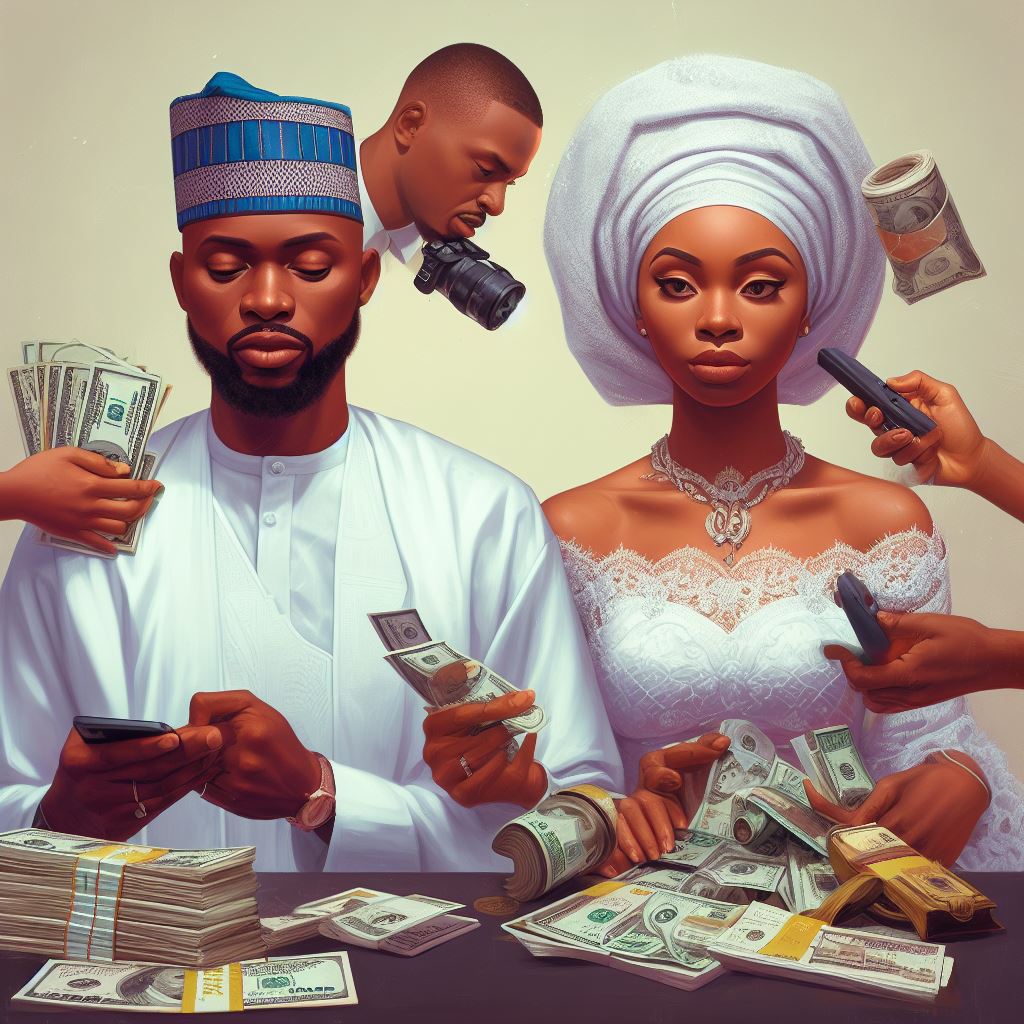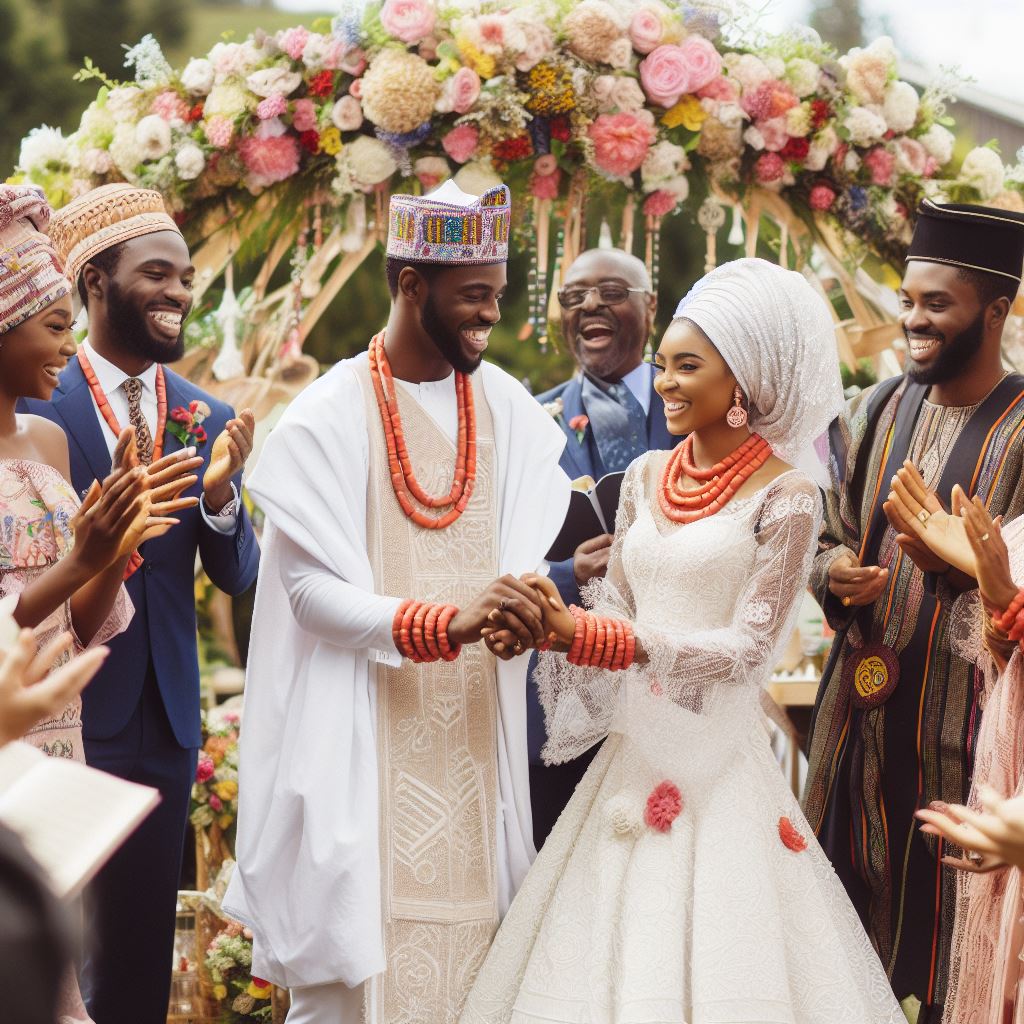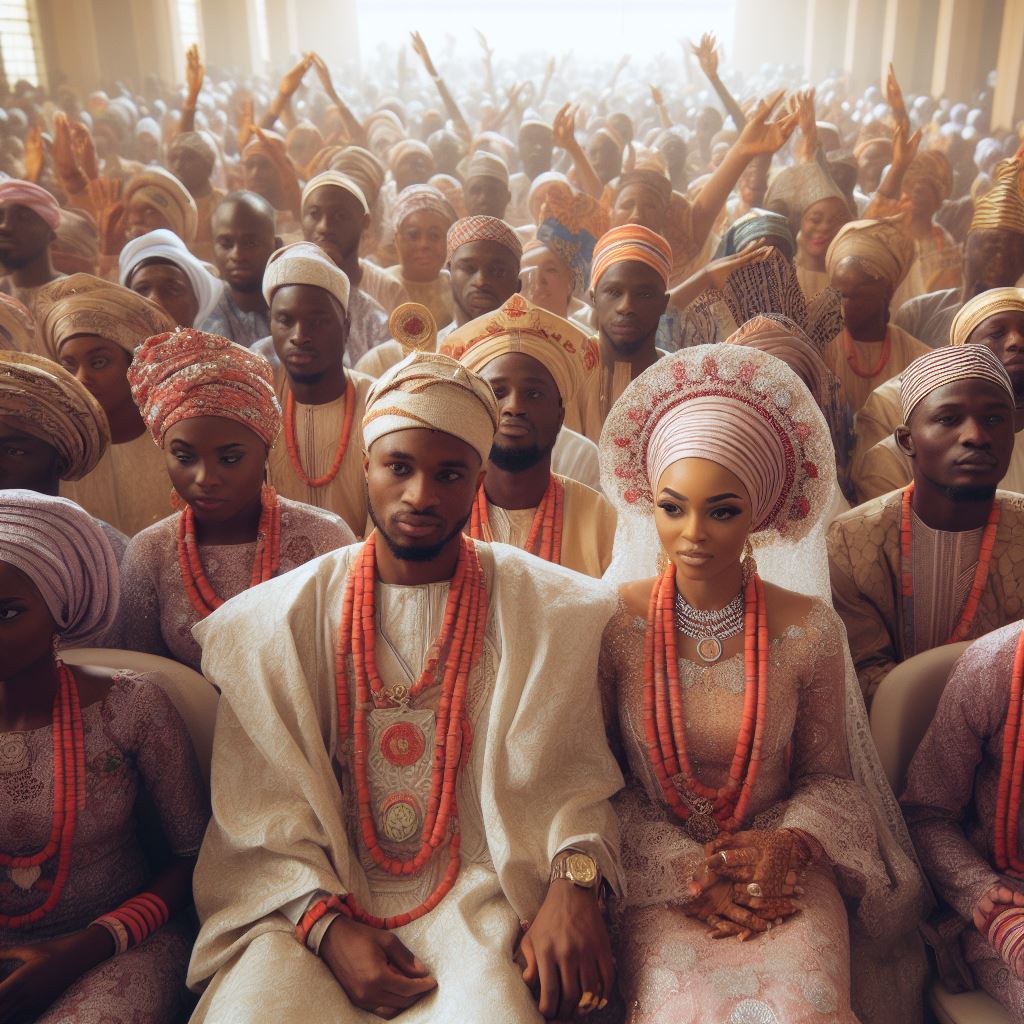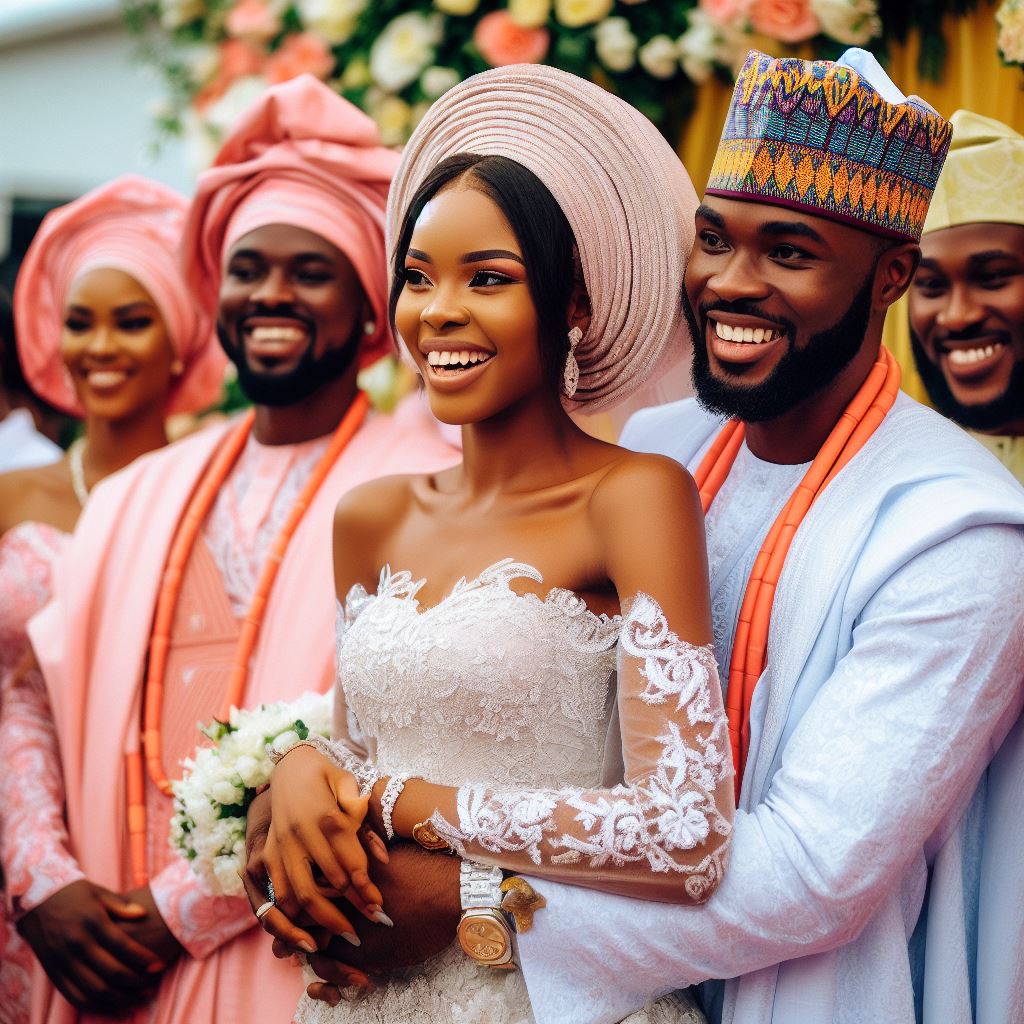Introduction
Marriage holds immense significance in Nigerian culture, where it transcends love and romance.
This blog post aims to explore the multifaceted aspects of Nigerian marriage beyond these traditional notions.
Nigerian marriages are not solely about love and romance; they are intricate ceremonies that encompass various dimensions.
In this blog post, we will delve into the cultural, social, and economic aspects of Nigerian marriages, shedding light on their significance.
From the elaborate wedding ceremonies to the intricate rituals, Nigerian marriages are a celebration of culture and heritage.
Beyond love and romance, Nigerian marriages are a symbol of unity, family values, and societal cohesion.
These marriages serve as a way to strengthen social bonds and ensure continuity of family lineage.
Moreover, Nigerian marriages have an economic aspect, as they often involve dowry and significant financial transactions.
They are also seen as a way of forging alliances and cementing relationships between families.
In general, Nigerian marriages are not merely about love and romance, but rather a complex bond that intertwines culture, tradition, and socioeconomic considerations.
By exploring these aspects, we can gain a deeper understanding of the richness and significance of Nigerian marriages.
Traditional Nigerian Marriage Customs
Nigerian marriages cherish valued traditions and customs, uniting families and communities while celebrating cultural heritage.
- Traditional customs bind couples and ensure successful unions.
- Family involvement and parental blessings are highly esteemed.
- Parents guide and mentor their children, preparing them for lifelong commitments.
- Elaborate ceremonies unite families and showcase cultural heritage.
- Rituals symbolize unity, respect, and fertility.
- Dowry payment expresses gratitude and responsibility.
- Elders offer blessings and ensure adherence to cultural norms.
- Festive feasts foster unity and community joy.
- Music and dance performances create a celebratory atmosphere.
- Symbolic attire represents cultural heritage, family values, and future aspirations.
In essence, Nigerian marriage customs honor traditions, family, and cultural significance, strengthening bonds and celebrating love.
Read: The Influence of Nollywood on Nigerian Wedding Wishes
Emphasis on Commitment
In Nigerian marriages, commitment is highly valued, regarded as a sacred bond that entails a lifelong commitment.
This commitment is emphasized in various ways, including the traditional vow exchange.
1. Highlighting the value placed on commitment
In Nigerian culture, marriage is not simply about love and romance; it is a commitment that goes beyond personal desires.
Couples prioritize commitment above all else as the cornerstone of a successful marriage.
2. The concept of a “sacred bond” and the belief in lifelong commitment
Nigerians view marriage as a sacred bond between two individuals, ordained by a higher power.
This belief instills the idea that marriage is meant to last a lifetime, and divorce is seen as a last resort.
3. The traditional vow exchange and its implications
During a Nigerian wedding ceremony, couples exchange vows in front of their families, friends, and often religious leaders.
Couples take these vows very seriously, considering them binding commitments that symbolize their dedication to each other.
4. The weight of the vows
In Nigerian weddings, the exchange of vows is not taken lightly.
It is crucial to understand that the spoken words in this ritual bear immense significance, and breaking these vows is seen as a betrayal of trust and a violation of the sacred bond.
5. Fulfilling the commitment beyond challenges
Nigerian couples are expected to honor their commitment, even during difficult times.
They understand that marriage requires effort, sacrifice, and compromise, and they are willing to work through challenges to keep their bond strong.
6. The role of family and community
Commitment in Nigerian marriages is not solely between the couple; it involves their families and the community as well.
There is an expectation that these external parties will provide support and guidance to help the couple uphold their commitment.
7. Cultural and religious influences
Religion plays a significant role in Nigerian marriages, reinforcing the concept of commitment.
Religious teachings emphasize the sanctity of marriage and the importance of remaining faithful and loyal to one’s spouse.
8. The long-lasting impact of commitment
In Nigerian society, couples who exemplify commitment become role models for others.
Their ability to navigate challenges, maintain trust, and prioritize their relationship serves as an inspiration for both younger generations and their peers.
In fact, commitment holds immense value in Nigerian marriages.
From the belief in a sacred bond to the seriousness of the vow exchange, Nigerian couples prioritize their commitment above all else.
This emphasis on commitment contributes to the longevity and strength of their unions, serving as a testament to the enduring power of love and dedication.
Read: Nigerian Proverbs: Wisdom on Love and Marriage
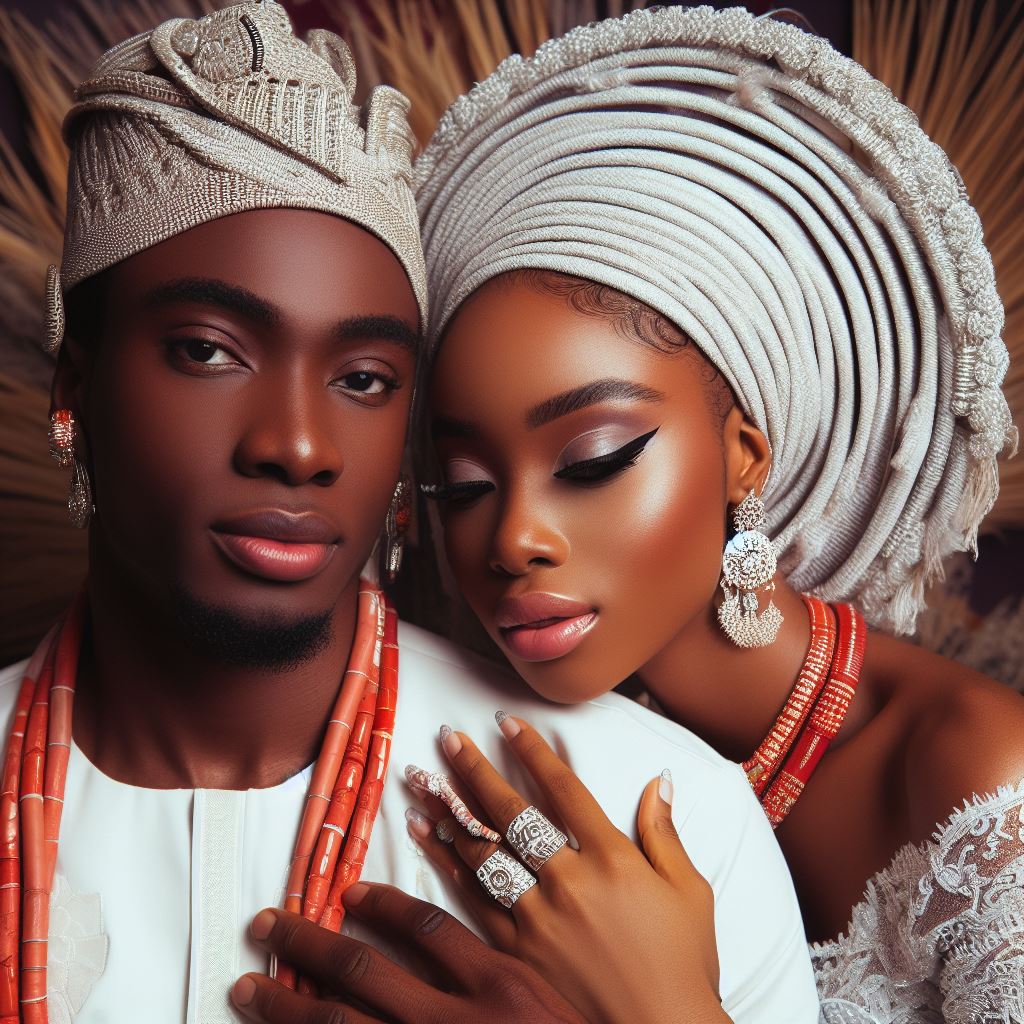
Focus on Unity and Partnership
Unity and partnership are fundamental in Nigerian marriages.
They go beyond love and include mutual support, cooperation, and teamwork.
- Nigerian couples believe in unity as a foundation.
- They provide emotional support through challenging times.
- Cooperation is essential for harmony and balance.
- Couples share household responsibilities, financial duties, and decisions.
- Teamwork helps achieve common goals together.
- Couples rely on family and the community for support.
- This unity creates a strong support system.
- It fosters trust, security, and emotional connection.
- Mutual respect is the foundation for unity.
- Open communication and joint decision-making are crucial.
To implement unity and partnership, couples invest in strengthening their bond through counseling and advice from experienced couples.
Nigerian marriages prioritize relationship well-being above individual desires, understanding that teamwork builds a lasting, fulfilling marriage.
Read: Inspirational Quotes on Marriage from Nollywood
Roles and Responsibilities
In Nigerian marriages, traditional gender roles significantly influence relationship dynamics, with distinct expectations for men and women.
- Men are the traditional breadwinners and providers.
- They ensure financial stability and family well-being.
- Men take on the role of household heads, making crucial decisions.
- They serve as protectors and security providers.
- Women’s traditional roles encompass homemaking and caregiving.
- They manage the household, including cooking and cleaning.
- Women nurture their children and oversee family finances.
- They provide emotional support and stand by their husbands.
- Traditional expectations for men include being strong, assertive, and ambitious.
- Men are expected to be faithful, loyal, and uphold marital sanctity.
- Women are expected to be obedient, respectful, and subservient to their husbands.
- Their focus is on prioritizing their husband’s needs and maintaining domestic responsibilities.
- Good motherhood is a crucial role for women.
- Family and household responsibilities hold immense importance in Nigerian marriages.
- Both men and women contribute to family stability and unity.
The family unit is a cornerstone of Nigerian society, and marriage perpetuates the family lineage.
Men provide financial and emotional support to immediate and extended family.
Women foster strong family bonds by creating a nurturing and loving environment.
Respecting and understanding these roles are vital for a harmonious marriage.
Read: Yoruba Sayings: Exploring Love and Union
Uncover the Details: Love Stories: From Lagos Romance to Lifelong Bonds
See Related Content: Marriage Laws and Regulations Every Nigerian Should Know
Extended Family Dynamics
In Nigerian marriages, the extended family plays a significant role, impacting the relationship profoundly.
Maintaining harmony is vital for success.
- Cultural traditions emphasize family bonds over individualism.
- The extended family acts as a support system, providing advice and assistance.
- Financial aid from the extended family is common for weddings or housing.
- In child-rearing, the extended family offers guidance and childcare support.
- In-laws and extended family influence the relationship dynamics.
- They may have expectations and create pressure, leading to conflicts and stress.
- In-laws can mediate disputes, facilitating conflict resolution and maintaining peace.
- Overly involved in-laws may strain the couple’s relationship and lead to disputes.
- Supportive in-laws provide valuable guidance, strengthening the couple’s bond.
- Maintaining harmony within the extended family is crucial for a Nigerian marriage.
- Open communication is essential to prevent misunderstandings.
- Respecting each other’s boundaries is vital for the couple and extended family.
- Expressing appreciation and gratitude fosters positive relationships.
- Addressing issues within the extended family promptly prevents further complications.
In short, the extended family significantly impacts Nigerian marriages, for better or worse. Harmonious relationships are essential.
Arranged Marriages
1. Prevalence of arranged marriages in Nigerian culture
- Arranged marriages are still prevalent in Nigerian culture, especially in traditional and conservative families.
- Parents and elders take the responsibility of finding suitable matches for their children.
- The consent of the individuals involved is sought, but the final decision often rests with the parents.
2. Reasons behind arranged marriages and their benefits
- Arranged marriages are rooted in the belief that parents know what is best for their children.
- It ensures compatibility between families, maintaining social, economic, and cultural ties.
- Arranged marriages prioritize stability, commitment, and long-term compatibility over fleeting romance.
- It reduces the likelihood of divorce as families screen potential partners based on shared values and backgrounds.
- Arranged marriages also strengthen family bonds and maintain harmony within extended families.
3. Changing dynamics and acceptance of love marriages in modern Nigerian society:
- With globalization and exposure to Western cultures, the acceptance of love marriages has increased.
- Younger generations are now prioritizing their own happiness and personal choices in selecting a life partner.
- Education, career opportunities, and urban living have contributed to the shift towards love marriages.
- Love marriages allow individuals to choose someone they genuinely connect with and have mutual feelings for.
- Modern Nigerian society acknowledges that love and romance are essential components of a successful marriage.
List of References:
- Ogunnubi, O. (2017). Arranged Marriages in Nigeria: Past, Present, and Future. Journal of African Studies and Development, 9(6), 69-79.
- Ajayi, B. (2018). African Traditional Marriage System: Its Impact on Cohesive Family Relationship. Journal of Sociology and Anthropology, 2(1), 13-21.
- Okoye, U. O. (2019). Impact of Western Civilisation on Marriage Practices in Nigeria. Advances in Social Sciences Research Journal, 6(8), 456-461.
Conclusion
Nigerian marriages go beyond love and romance.
They are rooted in tradition, culture, and strong family values.
The key points discussed in this blog post highlight how Nigerian marriages are more than just a bond between two individuals.
It is clear that love and romance play a significant role in Nigerian marriages, but they are not the sole foundation.
Nigerian couples prioritize commitment, respect, and loyalty, which contribute to the longevity of their unions.
The unique cultural aspects and values that make Nigerian marriages special cannot be overlooked.
The importance of family, community involvement, and traditional ceremonies reinforce the strength of these marriages.
These aspects create a sense of unity and support that is cherished by Nigerian couples.
While love and romance may initially spark a Nigerian marriage, it is the deep-rooted cultural values that sustain it.
Nigerian couples understand that these values form the solid foundation for their union and ensure its endurance through various challenges.
Nigerian marriages are a testament to the idea that love alone may not be enough to sustain a lasting relationship.
The commitment to family, culture, and tradition elevates Nigerian marriages, making them unique and enduring.
In essence, Nigerian marriages go beyond love and romance, emphasizing the importance of cultural aspects and values.
It is this combination that makes them special and lasting, standing as a symbol of unity and strength within the Nigerian community.

